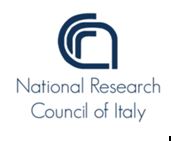The INCLUDE consortium brings together research centers, universities and schools of five European countries – Cyprus, Greece, Italy, Romania, Spain – with the aim toco-design and develop innovative educational approaches and resources joining points of view of researchers, teachers, students, policy makers, associations and other social actors.
CNR-IRPPS


The Institute for Research on Population and Social Policies of the National Research Council of Italy (CNR-IRPPS)
Founded in 1923, the National Research Council (CNR) is the largest public research institution in Italy, the only one under the Research Ministry performing multidisciplinary activities. CNR mission is to conduct research in order to promote innovation and competitiveness of the national industrial system, to foster the internationalization of the national research system, to provide technologies and solutions to emerging public and private needs, to advice Government and other public bodies.
IRPPS is an interdisciplinary research institute of the CNR conducting studies on social policies and welfare systems, education, relationships between science and society, creation/access/dissemination of knowledge and information technology, demographic and migration issues. Specifically, the Research Unit ‘Social Studies on Science, Education, Communication’, placed in Rome, aims to understand and enhance relationships between science, politics and society, combining science and society studies in the following fields: evidence and decision-making processes in the interaction between science, society and politics; science communication and scientific community; representations of international migrations and representations of migrants in textbooks; science teaching and participation in the scientific debate; scientific popularization and participatory models. Common to all topics is the use of participatory methodologies to involve various social actors in the research activities.
INCLUDE CNR-IRPPS staff (international coordinator): Adriana Valente, Claudia Pennacchiotti, Valentina Tudisca
NTUA


The National Technical University of Athens (NTUA)
The National Technical University of Athens (NTUA) is the oldest and most prestigious educational institution of Greece in the field of technology, and has contributed unceasingly to the country’s scientific, technical and economic development since its foundation in 1836. The School of Electrical and Computer Engineering (ECE NTUA) is well known in Greece and abroad for the research achievements of its faculty members and the good reputation of its students and alumni. The research performed in the ECE School is both of wide scope and high standard, in both fundamental and applied research, securing substantial grants from its researchers’ participation in competitive research programs in national and European level.
The Artificial Intelligence and Learning Systems Laboratory (AILS Lab) is one of the main research units of the ECE NTUA, directed by Professor Andreas-Georgios Stafylopatis. AILS Lab has been established as the union of two major ECE Laboratories, the Image, Video and Multimedia Laboratory (IVML) and the Intelligent Systems Laboratory (ISLab), pioneering from 1989 in areas like neural networks, multimedia content analysis, human interaction, fuzzy logics, ontological knowledge representation and reasoning. AILS Lab has been involved in more than a hundred EU R&D projects, in the area of artificial intelligence, machine learning and applications like multimedia content analysis, digital cultural heritage and data analysis.
INCLUDE NTUA reference staff: ParaskeviTzouveli, Kostas Karpouzis
UCY
The University of Cyprus (UCY)
The University of Cyprus (UCY) is a relatively young University, established in 1989 as the first University in Cyprus with the aim to become a leading educational and research institution, distinguishing itself internationally through the promotion of scholarship and being recognized as an institution of excellence in the Mediterranean region.
The main objectives of UCY are the promotion of scholarship and education through teaching and research and the enhancement of the cultural, social, and economic development of Cyprus. With 7,000 students and nearly 1,536 employees, UCY is the youngest institution to be ranked in the top 550 Higher Education Institutions in the world (placed in the 351- 400 group for 2015-2016 in the Times Higher Education World University Rankings). Furthermore, UCY has been recently ranked 55th worldwide in the “150 Under 50 Rankings” of the top 150 universities under 50 years old (THE World University Rankings). UCY has a vast experience in running small but also large scale research projects, at both national and international level.
INCLUDE UCY staff: Phoevos Panagiotidis
1st Experimental High School of Athens
1st Experimental High School of Athens
The 1st Experimental High School of Athens has a total of 25 teachers and 234 students, separated into 9c lasses (3 grades) of 26 students each.
The school collaborates with the University of Athens on a permanent basis. This collaboration includes cooperation in research projects, the University’s support for the implementation of innovative educational practices and providing practical training field for University students who intend to follow a career in education.
The school has established a series of procedures promoting the effort to build a modern educational institution: implementing the educational method of Content and Language integrated learning (CLIL), establishing a special program connecting foreign language teaching with other disciplines such as Biology, History, Home Economics, Geography; developing an annually organized program of cultural activities; establishing 15-20 groups of interest focusing on various subjects (film making, physics laboratories, debate competitions, popular dances, cooking), including students from different schools; developing a complete digital class, thus a full distant learning environment on MOODLE platform, for all educational disciplines; cooperating with scientific or social organizations (e.g. Amnesty International); connecting educational practice with the labor market, by developing an entrepreneurship program and participating in European projects (the KA2 Erasmus “Developing and Evaluating Skills for Creativity and Innovation”).
Visit the 1st Experimental High School of Athens website
INCLUDE 1st Experimental High School of Athens reference staff:
Maria Boumpouka, Kleopatra Kalogerakou, Costis Kontogiannis
Mircea Eliade School
Mircea Eliade School of Craiova, Romania
Mircea Eliade School is a primary public school situated in Craiova, a city of 300,000 inhabitants in the south-west of Romania, with around 1,200 students and 60 teachers. The school was founded in 1964 and over the years it has proved to be one of the best schools in the county based on national test results.
Since 2008 the school has been organizing a regional contest called 22 METS (Mathematics English Testing System), in which students test their Maths competences in English, using a CLIL approach. The school students were also involved in the international contest Mathematiques Sans Frontieres and received great scores. The school has a computer lab in which a lot of lessons in different curricular areas are taught using active methods and English teachers are familiarized with the basics principles of CLIL as they use them in order to develop students’ reading and writing skills.
Visit the Mircea Eliade School website
INCLUDE Mircea Eliade School staff:
Ioana Genoveva, Lidia Cazacu, Cornelia Patru
Institut Bisbe Berenguer
Institut Bisbe Berenguer of L’Hospitalet de Llobregat, Spain
Bisbe Berenguer is a secondary education school with about 520 students.The school is situated in an area with a high rate of immigrant students with specific linguistic and cultural needs. Accordingly, it is organized matching the students’ special needs through different educational frames and schemes.
The school is developing a strategic plan of social and cultural cohesion and integration, with a stress on the use of new technologies in all the educational programmes and the improvement of the school facilities and equipment.The enhancement and development of the students’ oral skills is an essential part of the school educational project and the curriculum of all the different areas, emphasizing the notion of multilingualism as a tool and a door to international exchanges with our European partners.
In the previous years, the school has been involved in a lot of different initiatives on Information and Communication Technologies (ICT). All classrooms are provided with computers and projection beamers, teachers received ICT-training and there are sufficient ICT-classrooms. That makes that most of the teachers have basic ICT-skills.
Visit Institut Bisbe Berenguer website
INCLUDE Institut Bisbe Berenguerreference staff:
Alex Roman Garcia, Clara Guerola
Carducci-King school of Casoria
Carducci-King school of Casoria, Italy
Istituto Comprensivo Carducci-King includes schools of both orders of the first cycle of compulsory education, plus thenursery school, with 1460 students (302 for kindergarten, 633 for primary schools, 525 secondaryschool of First Instance).
The school building is located in an area in the North of Naples affected by profound socio-economicand cultural changes, having changed from industrial powerhouse to degraded andabandoned area with a high risk of crime and with a migration, especially ethnic Rom, which fuelsschool drop.
So, it is necessary an efficient and effective linguistic communication to meet the learning needs of amulthi-ethnic audience. It becomes a priority:the improvement of foreign languages proficiency, which become vehicles to promote socialinclusion; teaching the curriculum through foreign languages; developing intercultural communication in a multicultural European environment and promoting theEuropean dimension.On this subject, the school has previous experiences in E-twinning projects and in the Erasmus+ KA2 Action.
Visit the IC Carducci-King website
INCLUDE IC Carducci-King staff:
Giovanni Buonocore, Nancy De Falco, Carmela Menna, Emilia Monaco, Angela Raffaella Pulcrano
